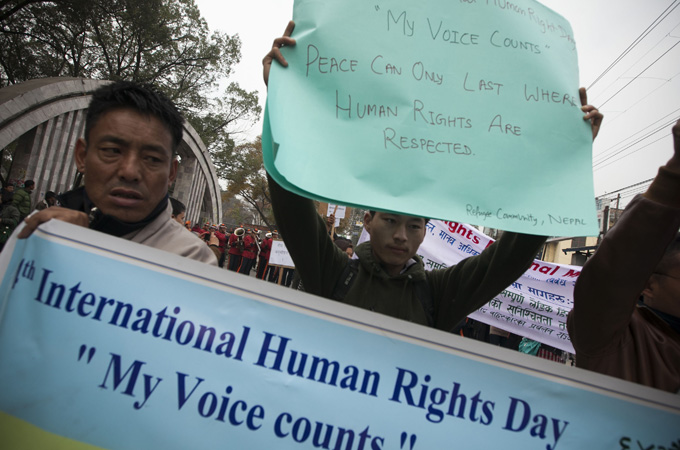|
The institutions and states that support fundamental human rights must act honestly, honourably and effectively.
Last Modified: 10 Dec 2012 - Al Jazeera
 |
| Without accountability for the violations of human rights, we will see more and more "cynical abuse of the very ideas that were born out of the horrors of the Second World War" [EPA] |
The United Nations has proclaimed December 10 as
International Human Rights Day. The day commemorates the signing of the
Universal Declaration of Human Rights in 1948, which represented the reaction
of the international community to the horrors of the Second World War. Today is
a day for reflection more than celebration. A cursory scan of events from the
last few weeks has thrown up examples that demonstrate that the belief in human
rights for all - in treating all states the same - is more of a tissue-thin membrane
than a robust bulwark.
"The Universal Declaration was a prudent recognition that states are obliged to ensure protection of fundamental rights that guarantee freedom and dignity of individuals and groups. Perhaps even more importantly, it represents the realisation that the international community is duty bound to assist in the protection of such rights."While it would be tempting to believe that we are on a permanent road of progress towards ever greater rights-respecting societies, with an effective and consistent support from the international community, there is rather serious cause for concern.
In the context of the UN General Assembly vote on the
Palestine's observer status in the UN, we had the profoundly distasteful
exhibition of double standards by France and the United Kingdom in trying to
extract promises from the Palestinian leaders that they would never seek to
refer Israel to the International Criminal Court (ICC). This cynical effort was
led by the same parties who call daily for accountability for the Assad regime
in Syria.
The issue here is not whether Israel has committed war
crimes and crimes against humanity, but rather that two powerful States Parties
of the Rome Statute for the ICC think it appropriate to impede even the
prospect of an independent and impartial investigation by the court that they
helped to create. This is grist to the mill for all those who claim that the
ICC is nothing but an instrument of Western political interests and it
relegates the people of Palestine to second class citizens in terms of the
possible protection they can expect from the court.
If the integrity of the ICC has been tarnished by France and
the UK, two key member states, the flagship of accountability set up by the UN
- the International Criminal Tribunal for Former Yugoslavia (ICTY) - has been
damaged by the Appeal Chamber's decision to acquit Croatian generals, Ante
Gotovina and Mladen Markac. The majority of the Appeals Chamber stands accused
by the minority and independent observers of distorting the findings of the
Trial Chamber and of significantly reducing the degree of protection civilians
can expect from attacks by combatants.
As a result, the Appeal Chamber has significantly re-written
the history of the Balkan conflict, indicating that there was nothing criminal
in the execution of the Croatian operation "Storm" directed against
Croatian Serbs. The unreasonably inaccurate reinterpretation of expert opinions
used to muddy the definition of excessive bombardment stands as a serious
weakening of the very purpose of the laws of war to protect civilians from
unnecessary harm.
Lastly, the recent violence in Goma in the eastern
Democratic Republic of Congo (DRC) is an indictment of both President Joseph
Kabila and the international community at large. In 2004, the Office of the
Prosecutor of the ICC, led by Luis Moreno Ocampo, had identified Bosco Ntaganda
as one of those most responsible for the commission of war crimes in the
province of Ituri and to seek a warrant for his arrest. In the years that
followed, President Kabila allowed Ntaganda to freely strut around the towns of
the eastern provinces, claiming it would be too destabilising to arrest him.
The international community was unwilling or unable to persuade him otherwise.
As a result, there was the frequently ignominious sight of
Ntaganda enjoying nightly dinners in the same restaurants where UN officials
would meet. Several days ago, the "M23" militia connected to Ntaganda
took Goma and demonstrated the truly feeble nature of the Congolese Army and
Kabila's government. At the same time, it undid in one violent week years of
painstaking efforts to rebuild local capacities and infrastructure, as well as
causing a humanitarian crisis by forcing out hundreds of thousands - again.
Developments around Gaza, Goma and Gotovina can be
interpreted in a number of ways. It would be easy to say that human rights
protection is really just a cynical manipulation of politics as usual. And that
is not a criticism without at least some merit. These three examples show
however that there has been progress. Fifty years ago, we did not have an ICC
whose States Parties could act as shamefully as the UK and France have
recently. We did not have an appetite to create an institution such as the ICTY
to try the crimes of the Balkan conflict of the 1990s. These examples show that
while there has been progress, it will be neither inevitable nor seamless. The
institutions and processes are filled, for better or worse, by human beings.
The enjoyment of fundamental human rights rests on more than
accountability, but without accountability for the violations of human rights,
we will see more and more cynical abuse of the very ideas that were born out of
the horrors of the Second World War. Eternal vigilance is the price of liberty.
It is not enough to create the institutions that will guarantee the protection
of fundamental human rights: we must, with renewed vigour, ensure that those
institutions and the states that support them, act honestly, honourably and
effectively.
Paul Seils is the vice-president of the International Center
for Transitional Justice.


No comments:
Post a Comment